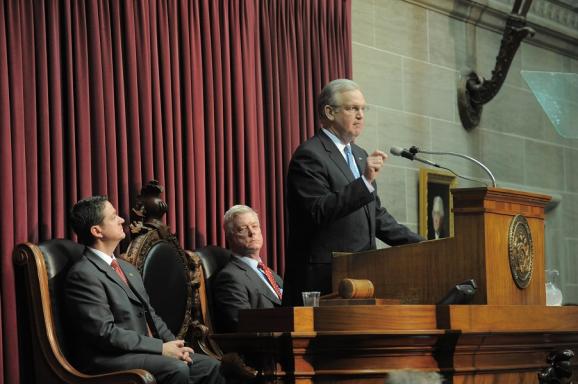
For many years, when the Missouri General Assembly sent a budget to a governor, the letter “E” appeared opposite of the dollar sign on certain appropriations.
“E” stood for estimate.
In 2009, for example, the legislature budgeted $65,000E to the Missouri State Highway Patrol “for the recoupment, receipt, and disbursement of funds for equipment replacement and emergency expenses.” Particularly on emergency response expenditures – unpredictable by definition – “E’s” were peppered throughout budget bills.
They were there for the costly state response to the Joplin tornado and flooding in 2011, as well as the brutal ice storms in 2009. But since then, budgeters have removed the E’s in an effort to control expenditures in their tight budgets, a process that was spearheaded by then-House Budget Committee Chairman Ryan Silvey, a Republican from Kansas City.
“I believe that ‘E’s’ are an inappropriate abdication of the legislature’s appropriation authority to the governor,” Silvey, now a member of the Senate Appropriations Committee, said on Saturday. “Nowhere in the Constitution or in statute is there an authorization for estimated appropriations. They were invented somewhere along the way years ago when the legislature got lazy.”
The “E’s” are nowhere to be found in this year’s operating budget. Now, as the state is facing a costly tab for its response to unrest in Ferguson following the grand jury’s decision not to indict the white police officer who fatally shot Michael Brown, Democratic Gov. Jay Nixon wrote to lawmakers on Saturday that he needs to call the General Assembly into a special session to allocate the money, instead.
“Unlike during previous emergencies,” Nixon wrote, “a special session is necessary here due to the removal o the ‘estimated’ designation from the emergency duty appropriations in the Fiscal Year 2015 budget, which provided the flexibility to deploy resources as necessary to respond to a disaster, without then necessity of seeking additional spending authority through a special session.”
Nixon said the Missouri National Guard and Highway Patrol – both of which were deployed to Ferguson during the state of emergency he ordered ahead of the grand jury’s announcement – are exceeding the nearly $7.4 million allocated to them to respond to state emergencies. That, he said, means they may not be able to meet payroll by December 15.
“Time is of the essence,” Nixon wrote.
What is not clear is how much more money Nixon is seeking, here less than halfway through the budget year. When asked on Saturday, a spokesperson for Nixon — noting the letter he sent on Saturday — said “that is the extent of the information for today.”
Silvey, along with half a dozen other lawmakers quizzed on Saturday, said they have not heard any indication of how much money the governor is seeking or when it is that Nixon is planning on asking them to return to the state capitol.
“If the Governor needs more money, he should call us back in and justify the expense,” Silvey said.
Senate Appropriations Committee Chairman Kurt Schaefer, a Republican from Columbia, said he is not convinced Nixon actually needs more money for the National Guard and Highway Patrol.
“We gave Nixon the dollar amount he asked for after he knew the E’s were coming off. We are currently evaluating his request in light of the fact that five months ago we have him $19 million for emergencies like this,” he said. “It does not appear that they’ve already spent what we gave him.”
The imminent Ferguson budget battle comes after a tumultuous legislative session during which Nixon and the legislature could not come to consensus on their revenue estimate they would use for Fiscal Year 2015. In the same session, lawmakers passed tax cuts that have led Nixon, a Democrat, to withhold large amounts of funding from various state agencies.
Aside from that rift, lawmakers are also readying to use any Ferguson special session as a way to investigate the Nixon administration’s handling of the National Guard, which held back during the rioting following the grand jury’s announcement while rioters were setting afire more than a dozen Ferguson businesses.
Rep. John Diehl, the House majority leader, said he expects Nixon “and those on his staff that made decisions during this crisis to come forward and appear before the legislature.”
“It is time for an accounting and for leadership that will not only communicate but work with the legislature to solve this crisis,” Diehl said.
